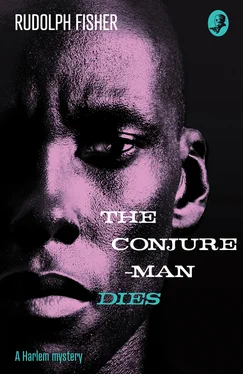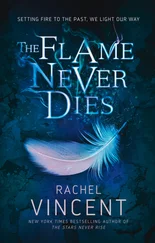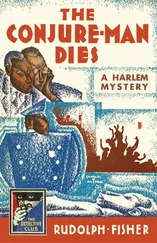They discovered nearby the doorway to the cellar stairs, which proved to be the usual precipitate series of narrow planks. In the cellar, which was poorly lighted by a single central droplight, they found a large furnace, a coal bin, and, up forward, a nondescript heap of shadowy junk such as cellars everywhere seem to breed.
All this appeared for the time being unimportant, and so they returned to the second floor, where the victim had originally been found. Dart had purposely left this floor till the last. It was divided into three rooms, front, middle and back, and these they methodically visited in order.
They entered the front room, Frimbo’s reception room, just as Bubber sidled belligerently up to Jinx. Apparently their entrance discouraged further hostilities, for with one or two upward, sidelong glares from Bubber, neutralized by an inarticulate growl or two from Jinx, the imminent combat faded mysteriously away and the atmosphere cleared.
But now the younger woman’s eyes lifted to recognize Dr John Archer. She jumped up and went to him.
‘Hello, Martha,’ he said.
‘What does it mean, John?’
‘Don’t let it upset you. Looks like the conjure-man had an enemy, that’s all.’
‘It’s true—he really is—?’
‘I’m afraid so. This is Detective Dart. Mrs Crouch, Mr Dart.’
‘Good-evening,’ Mrs Crouch said mechanically and turned back to her chair.
‘Dart’s a friend of mine, Martha,’ said the physician. ‘He’ll take my word for your innocence, never fear.’
The older woman, refusing to be ignored, said impatiently, ‘How long you ’spect us to sit here? What we waitin’ for? We didn’ kill him.’
‘Of course not,’ Dart smiled. ‘But you may be able to help us find out who did. As soon as I’ve finished looking around I’ll want to ask you a few questions. That’s all.’
‘Well,’ she grumbled, ‘you don’t have to stand a seven-foot cop over us to ask a few questions, do you?’
Ignoring this inquiry, the investigators continued with their observations. This was a spacious room whose soft light came altogether from three or four floor lamps; odd heavy silken shades bore curious designs in profile, and the effect of the obliquely downcast light was to reveal legs and bodies, while countenances above were bedimmed by comparative shadow. Beside the narrow hall door was a wide doorway hung with portières of black velvet, occupying most of that wall. The lateral walls, which seemed to withdraw into the surrounding dusk, were adorned with innumerable strange and awful shapes: gruesome black masks with hollow orbits, some smooth and bald, some horned and bearded; small misshapen statuettes of near-human creatures, resembling embryos dried and blackened in the sun, with closed bulbous eyes and great protruding lips; broad-bladed swords, slim arrows and jagged spear-heads of forbidding designs. On the farther of the lateral walls was a mantelpiece upon which lay additional African emblems. Dr Archer pointed out a murderous-looking club, resting diagonally across one end of the mantel; it consisted of the lower half of a human femur, one extremity bulging into wicked-looking condyles, the other, where the original bone had been severed, covered with a silver knob representing a human skull.
‘That would deliver a nasty crack.’
‘Wonder if it did?’ said the detective.
They passed now through the velvet portières and a little isthmus-like antechamber into the middle room where the doctor had first seen the victim. Dr Archer pointed out those peculiarities of this chamber which he had already noted: the odd droplight with its horizontally focused beam, which was the only means of illumination; the surrounding black velvet draping, its long folds extending vertically from the bottom of the walls to the top, then converging to the centre of the ceiling above, giving the room somewhat the shape of an Arab tent; the one apparent opening in this drapery, at the side door leading to the hallway; the desk-like table in the middle of the room, the visitors’ chair on one side of it, Frimbo’s on the other, directly beneath the curious droplight.
‘Let’s examine the walls,’ said Dart. He and the doctor brought their flashlights into play. Like two off-shoots of the parent beam, the smaller shafts of light travelled inquisitively over the long vertical folds of black velvet, which swayed this way and that as the two men pulled and palpated, seeking openings. The projected spots of illumination moved like two strange, twisting, luminous moths, constantly changing in size and shape, fluttering here and there from point to point, pausing, inquiring, abandoning. The detective and the physician began at the entrance from the reception room and circuited the black chamber in opposite directions. Presently they met at the far back wall, in whose midline the doctor located an opening. Pulling the hangings aside at this point, they discovered another door but found it locked.
‘Leads into the back room, I guess. We’ll get in from the hallway. What’s this?’
‘This’ proved to be a switch-box on the wall beside the closed door. The physician read the lettering on its front. ‘Sixty amperes—two hundred and twenty volts. That’s enough for an X-ray machine. What does he need special current for?’
‘Search me. Come on. Brady, run downstairs and get that extension-light out of the back of my car. Then come back here and search the floor for whatever you can find. Specially around the table and chairs. We’ll be right back.’
They left the death chamber by its side door and approached the rearmost room from the hallway. Its hall door was unlocked, but blackness greeted them as they flung it open, a strangely sinister blackness in which eyes seemed to gleam. When they cast their flashlights into that blackness they saw whence the gleaming emanated, and Dart, stepping in, found a switch and produced a light.
‘Damn!’ said he as his eyes took in a wholly unexpected scene. Along the rear wall under the windows stretched a long flat chemical work-bench, topped with black slate. On its dull dark surface gleamed bright laboratory devices of glass or metal, flasks, beakers, retorts, graduates, pipettes, a copper water-bath, a shining instrument-sterilizer, and at one end, a gleaming black electric motor. The space beneath this bench was occupied by a long floor cabinet with a number of small oaken doors. On the wall at the nearer end was a glass-doored steel cabinet containing a few small surgical instruments, while the far wall, at the other end of the bench, supported a series of shelves, the lower ones bearing specimen-jars of various sizes, and the upper, bottles of different colours and shapes. Dart stooped and opened one of the cabinet doors and discovered more glassware, while Dr Archer went over and investigated the shelves, removed one of the specimen-jars, and with a puzzled expression, peered at its contents, floating in some preserving fluid.
‘What’s that?’ the detective asked, approaching.
‘Can’t be,’ muttered the physician.
‘Can’t be what?’
‘What they look like.’
‘Namely?’
Ordinarily Dr Archer would probably have indulged in a leisurely circumlocution and reached his decision by a flank attack. In the present instance he was too suddenly and wholly absorbed in what he saw to entertain even the slightest or most innocent pretence.
‘Sex glands,’ he said.
‘What?’
‘Male sex glands, apparently.’
‘Are you serious?’
The physician inspected the rows of jars, none of which was labelled. There were other preserved biological specimens, but none of the same appearance as those in the jar which he still held in his hand.
‘I’m serious enough,’ he said. ‘Does it stimulate your imagination?’
Читать дальше












